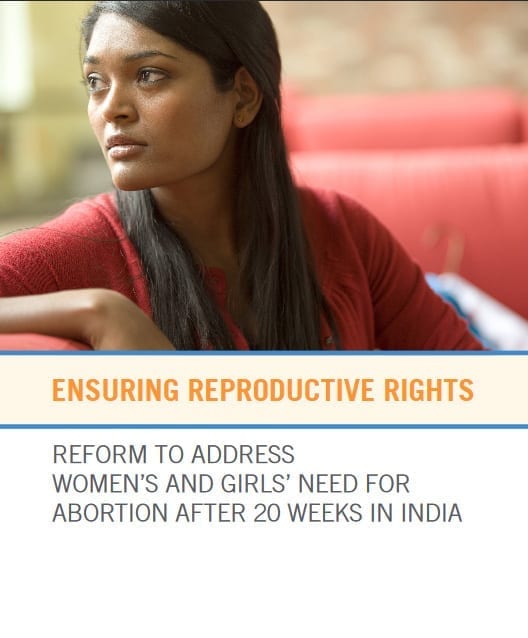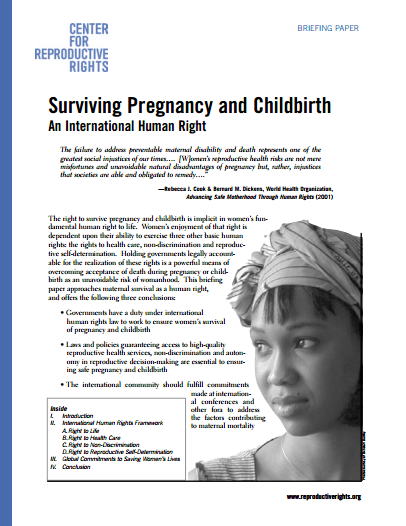Study Exposes Government Neglect Of Women’s Health In East And Southeast Asia
Provides Legal Strategies to Hold Policymakers Accountable
Manila, Philippines- Governments in East and Southeast Asia must work much harder to serve the reproductive health needs and promote the autonomy of the women in their region, according to a new report released today in Manila, Philippines by the Center for Reproductive Rights.
The latest volume of the Center’s acclaimed Women of the World series, Women of the World: Laws and Policies Affecting Their Reproductive Lives – East and Southeast Asia provides evidence that women in East and Southeast Asia have alarming rates of unplanned pregnancies, unsafe abortions, sexual trafficking and violence, as well as soaring rates of HIV/AIDS infection as a result of bad laws or failure to implement good laws. The report urges specific actions that governments and nongovernmental organizations in the region should take to protect women’s health and human rights.
Women of the World: Laws and Policies Affecting Their Reproductive Lives – East and Southeast Asia is based on almost three years of research by the Center and five nongovernmental organizations across the region including the Asian-Pacific Resource and Research Center for Women (Malaysia), the Population Research Institute at Renmin University (China), the Institute for Social Studies and Action (Philippines), Women’s Health Advocacy Foundation (Thailand) and the Research Center for Gender, Family, and Development (Vietnam). The report provides an extensive examination of laws and policies influencing women’s reproductive health in China, Malaysia, the Philippines, Thailand and Vietnam. It offers advocates and policymakers a broad view of laws affecting reproductive freedom, and draws attention to specific issues that require legal and policy reform.
“This groundbreaking study exposes how governments throughout the region are failing to protect women’s health,” says Melissa Upreti, Legal Adviser for Asia at the Center for Reproductive Rights. “This report offers advocates and policymakers pertinent information and strategies to establish accountability and secure remedies for persistent inequities and violations of women’s reproductive rights.”
Highlights of Common Reproductive Health Problems in East and Southeast Asia Due to Bad Laws
MATERNAL DEATHS: In the Philippines the maternal death rate is 200 per 100,000, more than 20 times the rate in the U.S. One third of women in Vietnam receive no pre-natal care.
ABORTION: In the Philippines, where abortion is illegal except to save a woman’s life, over 1000 women have illegal and unsafe abortions every day, and illegal abortion is the fourth leading cause of maternal death. In Thailand, up to one third of women seeking abortions develop severe complications.
CONTRACEPTION: In Malaysia and the Philippines, almost 70% of women do not use modern methods of birth control. Adolescents lack access to services and information as a result of which the rate of teenage pregnancy in many parts of the region is considerably high.
HIV/AIDS: In Vietnam 60% of HIV carriers were adolescent in 2001. In Malaysia, the largest proportion of infected women is composed of housewives.
SEX TRAFFICKING: In Thailand, laws that seek to protect girls against trafficking for commercial sex are not enforced. Of 355 people arrested for violation of the Prostitution Prevention and Suppression Act between 1996 and 1999, only 14 were convicted and sentenced.
REPRODUCTIVE AUTONOMY: In China, couples with more than one child may be subject to harsh penalties such as social compensation fees and denial of state benefits.
Among the RECOMMENDATIONS to correct these problems:
- Introduce comprehensive sexual and reproductive health laws that guarantee the right to access health services and reproductive autonomy.
- Abolish criminal abortion laws and create universal access to safe and affordable abortion services.
- Make access to maternal health care, including emergency obstetric care, available to all women regardless of their economic, social and political status.
- Eliminate discrimination in the delivery of health services and information on the basis of age and marital status and involve adolescents in the development of laws and policies pertaining to their health and rights.
- Empower women to protect themselves against HIV/AIDS and enact laws to protect them against discrimination and violence.
- Strictly enforce laws that criminalize the trafficking of women and children.
- Remove legal and social barriers that interfere with individual choices regarding the number, timing and spacing of one’s children.
- Hold governments accountable for violations of reproductive rights.
Other volumes in the Women of the World series document reproductive health law and policy in Anglophone Africa, East Central Europe, Francophone Africa, and Latin America and the Caribbean.
To order Women of the World – East and Southeast Asia or other volumes in the series, contact Talar Attarian at [email protected]. To view the report online, go to //www.reproductiverights.org/pub_bo_seasia.html
,


